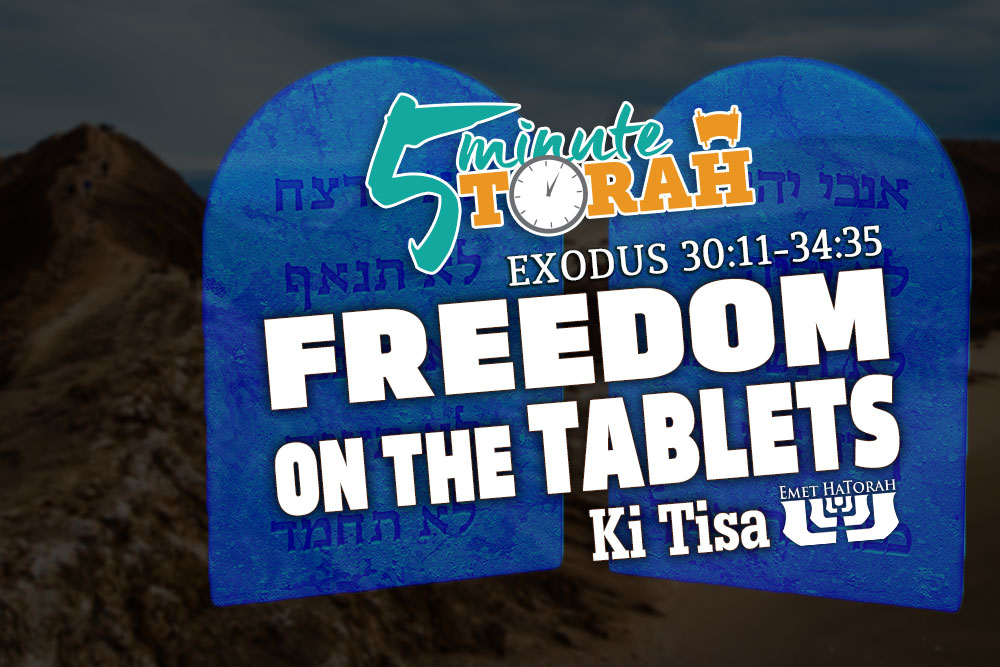Parashat Ki Tisa - Exodus 30:11-34:35
Series:

Freedom On The Tablets
Parashat Ki Tisa is the transition between Moses’ encounter with the LORD on top of Mount Sinai and his return to the Children of Israel at the base of the mountain. While in the sublime presence of God, he was given a very special gift, “the two tablets of the testimony, tablets of stone, written with the finger of God” (Exodus 31:18). The midrash tells us that these tablets were brilliant to look at, because they were made with lapis lazuli, a deep blue semi-precious stone with intense color. The Torah uses the following description for the tablets:
Then Moses turned and went down from the mountain with the two tablets of the testimony in his hand, tablets that were written on both sides; on the front and on the back they were written. The tablets were the work of God, and the writing was the writing of God, engraved on the tablets. (Exodus 32:15–16)
These commandments were not just something Moses came up with. These words, as well as the very tablets themselves, were given by God himself. Our sages use this passage to relate an important message about divine origins of the commandments God gave Moses to transmit to the Children of Israel:
It says: “And the tablets are the work of G-d, and the writing is G-d’s writing, engraved on the tablets” (Exodus 32:16). Read not “engraved” (charut), but “liberty” (cheirut)—for there is no free individual, except for he who occupies himself with the study of Torah. And whoever occupies himself with the study of Torah is elevated, as is stated (Numbers 21:19), “And from Mattanah (“the gift”) to Nahaliel, and from Nahaliel to Bamoth (“the heights”). (Avot 6:2)
Here the sages use a play on words where the Hebrew word charut (“engraved”) is read slightly different than the simple reading. Using the same letters that are written in the Torah (which has no vowels), a single vowel sound is changed to infuse this passage with new meaning. Not only can we read it as charut (“engraved”), but we can also read it as cheirut (“liberty” or “freedom”).
When most people think about God’s Law, the furthest thing from their mind is liberty or freedom. Because of a persistent misunderstanding of Paul, most people have a view of God’s Law that conjures images of oppression. But God is giving these commandments to a people he had just liberated from the oppression of Pharaoh. Why would he deliver them from one form of tyranny to another? This is why our sages give us an alternate reading of this passage.
James, the brother of our Master Yeshua, understood the Torah in this context and viewed it with high regard. In two places he speaks of it with affection, alluding to this same rabbinic understanding of God’s Law being “freedom on the tablets.” He tells us:
But be doers of the word, and not hearers only, deceiving yourselves. For if anyone is a hearer of the word and not a doer, he is like a man who looks intently at his natural face in a mirror. For he looks at himself and goes away and at once forgets what he was like. But the one who looks into the perfect law, the law of liberty, and perseveres, being no hearer who forgets but a doer who acts, he will be blessed in his doing. (James 1:22-25)
So speak and so act as those who are to be judged under the law of liberty. For judgment is without mercy to one who has shown no mercy. Mercy triumphs over judgment. (James 2:12–13)
James clearly tells us that there is a big difference between a hearer and a doer. Maybe God’s Law is not as burdensome as we have imagined. Maybe it is only a burden when we walk away from its instruction and fall into our own devices. Maybe, as James tells us, it is only a place of bondage when we hear its instruction but refuse to obey. Following God’s instructions, however, frees us from running headlong down the path of destruction created by our own wisdom and our own boundaries.
Yeshua, being the incarnate Word of God, embodies the wisdom of the Torah and commandments. Therefore, when we follow Yeshua, while simultaneously holding onto the commandments of God, we are walking in freedom (Revelation 12:17; 14:12). God’s Torah is not a burden, but freedom. John reminds us of this by teaching us, “For this is the love of God, that we keep his commandments. And his commandments are not burdensome” (1 John 5:3). What is written on the tablets? A bunch of restrictive laws that seek to dominate our lives? No. There is freedom written on the tablets. But only if we can look diligently enough to see it.








